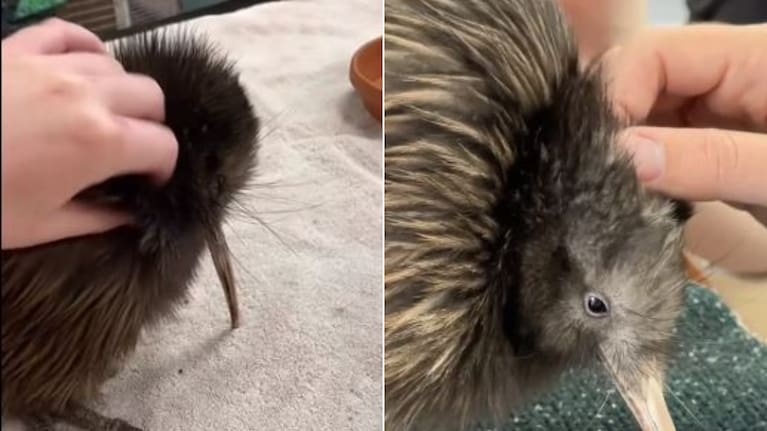The treatment of a kiwi is being criticised after the bird was filmed being stroked by zoo patrons under bright lighting as part of an encounter experience.
Videos show the kiwi at Florida's Zoo Miami being handled, fed and stroked by visitors.
In one clip, a person is seen scratching the bird on its back and neck.
They shared the clip to Tiktok with a caption saying: "He literally was like a little puppy."
Other clips show the kiwi running around in a setting which appears to be daylight - despite kiwis being nocturnal.
Copies of the videos shared online have prompted several people to share concerns over the kiwi's wellbeing.
"This video makes me feel a bit uncomfortable," one person said, referencing a time they visited a kiwi at an enclosure in New Zealand which had a large, darkened room in a quiet setting.
"There were ‘stars’ on the ceiling and nature sounds were playing in the background. It was super chilll," they added.
Zoo Miami offers visitors a chance to get up close with its kiwi named Paora. (Source: Supplied)
Another said they reported the video to the Department of Conservation, adding: "It makes me quite sad to see our national bird being paraded around for profit."
The opportunity to get up close and personal with a kiwi at Zoo Miami is advertised across their social media and website.
"Travel to the back areas of the zoo to meet a bird (not the fruit!). A bird considered one of New Zealand’s national treasures," an advertisement reads.
"This flightless bird with tiny wings and a long narrow beak will steal your heart as you spend time with him and his keepers in a one-of-a-kind experience, you’ll be sure to cherish forever."
The offer is available on Tuesdays, Thursdays, Saturdays and Sundays at 12.30pm only.
It will cost a visitor about NZ$36 but is available online for $34.
An Instagram post from their official social media account states: "Ready for a one-of-a-kind encounter? Meet the Kiwi, a rare flightless bird from New Zealand, exclusively at Zoo Miami."
The bird, named Paora, was the first kiwi to ever hatch in Florida. The event was celebrated with an official ceremony attended by former New Zealand Ambassador Rosemary Banks in 2019.
There are five different species of kiwi, four of which have been deemed ‘vulnerable’, while the fifth is regarded as ‘near threatened’.

A Change.org petition by Jeseka Christieson has garnered more than 1700 signatures at the time of publishing.
"We may not be able to bring Paōra home, but we do have the ability to get him the care he deserves.
"We hope this petition can reach someone who has the power to spark an investigation into his conditions, and relocate him to a more suitable environment."
In a statement DOC’s director of terrestrial biodiversity Hilary Aikman told 1News kiwi are a taonga species and are treasured by all New Zealanders.
"The protection and welfare of kiwi is a high priority. In New Zealand, we have specific standards to handle and care for kiwi, both in the wild and in captivity. New Zealand best practice has been developed to ensure kiwi are handled and housed safely and respectfully.
"The small population of about 60 kiwi offshore is managed separately from the New Zealand zoo and wildlife park population. The New Zealand population of 85 birds is coordinated by the Zoo and Aquarium Association (ZAA). The kiwi in America are managed via their national body, the Association of Zoos & Aquariums (AZA). Miami Zoo is a member of the AZA.
"The (ZAA) has a progressive, science-based approach to animal welfare. ZAA grants accreditation to zoos, aquariums and wildlife parks that have clearly demonstrated their commitment to positive welfare. This approach champions welfare from the animal’s perspective and it underpins all that they do.
"We thank those who have brought this to our attention and we will raise these concerns with Miami Zoo, via the AZA, to try to improve the housing and handling situation."
Zoo Miami and the Association of Zoos & Aquariums have been approached for comment.



















SHARE ME